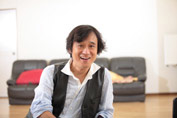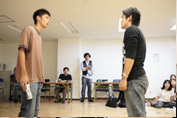Toshi Shioya, Actor, film director, producer and acting trainer President, WILL Do Co., Ltd.
“Seize the day” --- live your life today to the fullest, and it will create a bright future


What got you interested in acting?
When I was in high school, my brother was in college and was going to act in an English play. I went to see him act in The Merchant of Venice. I thought if my brother can do this, I can do it, too.
─ Is that why you joined Keio English Speaking Society (K.E.S.S.) at Keio University?
Yes. And because I was attracted to the older female students who invited me to join the club. And because I felt pretty good about my English after preparing for entrance exams. I wanted to join because powerhouse actors such as Masatoshi Nakamura were members of K.E.S.S. However, once I joined the club, I found out that one fourth of the members were returnees. Their pronunciation, vocabulary and expression skills were on a completely different level, and my confidence was smashed into little pieces. I wanted to catch up so I soaked myself in English at K.E.S.S. for my five years at university, I repeated a year. There were days when I wouldn’t speak a single word of Japanese. It was worth it, because by the time I graduated, I was able to communicate freely in English.
─ I heard that starring in an English musical at K.E.S.S. could lead to a career as a professional actor.
There is a project called “Model Production” held by E.S.S. members in the metropolitan area universities. Every spring, we would perform a musical in English. In my second year I got the leading role and producer Yoko Narahashi saw me perform. Ms. Narahashi is a graduate of Neighborhood Playhouse, an acting school in New York City famous for its Method training, an acting technique that focuses on the actor’s real life emotions. In recent years, she is known for her hand in casting films including The Last Samurai and Memoirs of a Geisha. She gave me acting lessons in English, and I made my debut as an actor in a drama she produced. This was the start of my career as an actor.
─ Today, you also work as director and producer. How did you get into these fields?
This also goes back to my days at university. The Four-University English Theatricals, which is known as the best students’ English theatrical performance in Japan, is held every year. 4 groups from 5 universities, Keio University, Waseda University, Rikkyo University, Hitotsubashi University, and Tsudajuku University, compete with each other to win the Grand Prix. While other universities perform classic pieces such as Shakespeare and Chekhov, I wanted to appeal to the audience with something intuitive, and came up with a rock musical with live music. What a reckless thing to do! The audience was stunned; just as we hoped.
─ And what was the result?
We won the Grand Prix. I experienced the real joy of production and that started me on the path to becoming a film director. I married the music director and she tells me that I haven’t changed from the time of the rock musical. I will probably be the same for the rest of my life, always looking for new challenges, because I am now 51 years old and there are still many things I want to try.
Parental love the theme of Winds from Zero
─ Please tell us about your film Winds from Zero, now showing in Japan.
Winds from Zero is a film based on a real person, Mrs. Kyoko Suzuki. I got to know her about 4 years ago. My wife said that she had recorded a nice news story about Mrs. Suzuki. There was Mrs. Suzuki standing under a cherry tree in full blossom, excited about entering Waseda University. I learned about her fierce battle, and thought that I had to make it into a film to share this story with as many people as possible. I started gathering information, and at the same time, visited more than 200 companies to raise money.
─ Tell us about Mrs. Suzuki’s battle.
In the spring of 2000, Mrs. Suzuki’s only son was hit by a car which killed him and his friend instantly. Her son had entered Waseda University one week before. The driver was trying to escape from a police car because he had his license suspended and was driving drunk. This was the driver’s third accident, but he was sentenced to only 5 years in prison, the maximum term for “causing deaths and injuries through professional negligence” at the time. Although she was in the depths of sorrow and despair, she questioned the light sentence, and with other people who felt the same way, she started a signature-collecting campaign for a tougher penalty. In two years, she collected some 370 thousand signatures. Her efforts paid off, and a new law covering “charges of dangerous driving resulting in deaths and injuries” was enacted in 2001.
─ Mrs. Suzuki’s battle didn’t end there, though.
That’s right. She studied for entrance exams sitting at her son’s desk, using his textbooks and notebooks. On her third try, she finally passed the exams.
─ That’s really amazing.
You think so? I’m not so sure. Every parent’s love for their child is the same. If you had to experience the same kind of tragedy, you wouldn’t be able to stay calm. This is what parental love is. She expressed her love for her son through collecting signatures and studying for entrance exams. She is not a “super mother”. She is a normal mother who simply loves her child. I wanted to express this normal love in my film. The film is a fiction based on a real story, but I focused on telling the truth. We rewrote the script more than ten times, and Mrs. Suzuki checked it every time. Making such a film was difficult because we had to invade her privacy. There were clashes of opinions and there were times when we both had to overexpose ourselves. However, all of this was worth it, because at the preview, Mrs. Suzuki said, “the heroine expressed what I am, even better than what I really am.” As the director of the film, this was a really great compliment. I believe that you will be able to feel something positive when see this film.
Pursue acting as a Japanese
─ You also head the Actors Clinic. What got you interested in training other people?
When I was about 30 years old, I started acting in international films. Thanks to the hard training at K.E.S.S., I was able to act in Australian and Hollywood films and although I had a good reputation, I always felt something was wrong. Then one day, I realized that even if I can speak English, I am a Japanese. It may be important to see Japan from the outside, but I have to think about my position as a Japanese actor. This led to the establishment of the Actors Clinic in 1994, which aims to train actors in a practical way that meets the needs of Japanese film shooting. So far, more than 7 thousand people have taken our lessons including new actors who belong to major productions. No matter how busy I am, I directly teach students, once a week in Tokyo and once every two weeks in Osaka. The energy I absorb from them is overwhelming. I can even say that I was able to come this far because their energy always supported me. The role of the clinic is to inspire people and to give them chances. I want my students to become actors, and moreover, I want to encourage and foster collaboration among films, screenplays, and novels. That is why I make films with my students. I hope I can continue making good films.
─ Finally, can you give us a message for Keio University students?
I would like to repeat the famous phrase from the film Dead Poets Society, spoken by Robin Williams who acts as a teacher: “Seize the day”. Seize this very moment. In other words, live your life today to the fullest and it will create a bright future. My starting point was the days I spent at Keio University. I hope you make the best of every moment of your university life.
Toshi Shioya (born Noriaki Shioya) graduated from the Faculty of Letters in 1981. In 1980, while a student at Keio University, he made his debut as an actor. He has acted in many domestic and international TV dramas as well as films, including the NHK TV drama Oshin and the Australian film Prisoners of the Sun. In 1994, he established the “Shioya Toshi Actors Clinic” (now the “Actors Clinic”), in order to train actors in a practical way that meets the needs of Japanese film shooting. He has expanded his career and has been a successful producer and director since his first film Bounce koGALS (1997), which features many of his students.
